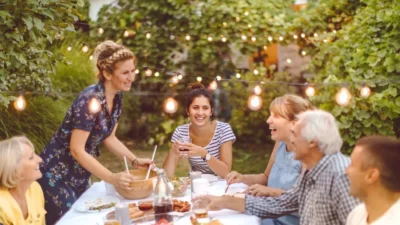Planting the Seed: How to Encourage Environmental Action in Others

It can be frustrating. You’ve made changes to help the planet – eating vegan, ditching single-use plastic, going car-free. You’ve read the climate reports, watched the documentaries and felt the emotional weight of ecological destruction. The urgency is clear to you.
But when you try to share your concern with others, something strange happens – you’re met with apathy, resistance or even defensiveness. You cook a delicious vegan meal for your family, and someone jokes about bacon. You suggest turning off lights or cutting back on fast fashion, and people politely nod in agreement but essentially ignore you.
It’s disheartening – but it’s not hopeless. Encouraging environmental action, especially through veganism, requires more than just facts and urgency, as human behaviour is complex, shaped by habits, emotions, identity and social influence. If we want to truly engage others, we need more than good intentions – we need to understand how change happens.
It isn’t just about having the most compelling facts or the strongest moral argument – it’s about psychology. To foster real, lasting change – especially the kind linked to environmental veganism – we need to work with the grain of human behaviour, not against it.
Why people don’t always act (even when they care)
It’s tempting to assume that people don’t act because they don’t care, yet most people aren’t indifferent to the planet. Deep down, they understand that our current way of life is unsustainable, but between knowing and doing, there’s a big gap that is often filled with emotional and structural obstacles. The ‘value-action gap’ has long been studied by psychologists and is common when looking at environmental behaviour.
Some people feel overwhelmed, others don’t know where to start and many are afraid of being judged or giving up things they love. Some don’t act simply because they’ve never seen change as being doable or inviting.
In other words, resistance isn’t always rejection. It’s often confusion, insecurity or fear hiding behind a shrug.
Take environmental veganism as an example. A person may agree in principle that factory farming is harmful to the environment, but if their family or friends mock veganism or they lack the cooking skills, they’re unlikely to change.
The good news is – you can influence all three of those areas if you know how.
Let change be contagious, not confrontational
One of the best ways to get others to act is not by telling them but showing them.
You don’t have to debate or convince. In fact, people are more likely to change when they feel safe and unpressured – and that’s why your actions matter so much.
Let your lifestyle speak for itself. Let others see your compost bin, your plant-based meals, your reusable containers. Make it all look normal – not radical, not restrictive, not perfect. Just part of life.
And when someone shows interest – even just a passing comment – be ready with encouragement, not a lecture.
Speak to what they care about
Everyone is driven by different motivations. Some people care about animals while others are more moved by their children’s future. Some want to save money or improve their health while others are worried about wildfires or clean air. Your job is to listen and connect to their concerns, not to preach.
If a friend loves to cook, share a plant-based recipe that’s delicious and easy. If your sibling is into fitness, talk about how a vegan diet helped your energy levels. If your colleague is into travel, discuss ways to offset carbon or choose greener destinations.
When people feel that environmental action supports the life they want, not threatens it, they’re far more likely to join in.
Start small. Go together.
Big changes feel daunting. But small steps are often all it takes to get someone moving.
Invite people to join you in a challenge: Viva!’s V7 or V30 challenge, Halfway Heroes or a week of zero waste. Offer to cook for them. Gift them a cool reusable bottle or a plant-based cookbook. Share a documentary that moved you – but don’t expect a conversion. Just plant a seed.
Even a tiny shift – a non-dairy coffee, a thrifted outfit, a meat-free lunch – can open the door to more changes. And always celebrate progress. When someone tries something new, acknowledge it as encouragement goes much further than criticism.
Make it easy to choose better
Doing the environmentally friendly thing isn’t always the easiest and that’s why one of the most helpful things you can do is to remove barriers and add support.
Share tips and tools that have worked for you. Recommend local vegan spots or plastic-free stores. Offer shortcuts – your go-to lunch, your best zero-waste swaps, your easiest meal prep. Send links, lend books, share resources.
If someone wants to try something new, offer to do it with them. Co-create a vegan meal plan. Shop together. Do a Sunday cooking session. Changing habits feels a lot less scary when you’re not doing it alone.
Be real. Be relatable. Be kind.
You don’t have to be perfect to be inspiring. In fact, people relate more to your missteps than to your perfection.
Talk about the time you struggled to give up cheese or how you sometimes miss the convenience of fast fashion. Share your learning curve. Laugh at your old mistakes. Be honest and vulnerable.
When you show that you’re not judging them, people let their guard down. When they feel safe to try and fail, they’re more likely to give something a go. Lead with kindness, not criticism. Curiosity, not control.
Environmental change isn’t a moral contest – it’s a collective journey.
Let it grow, naturally
Inspiring others is a long game. Sometimes the people you care about won’t change right away; sometimes they’ll ignore you, tease you or argue back. That’s okay – seeds don’t grow overnight. Just keep showing up, keep living in alignment with your values and keep planting those seeds.







